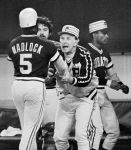PITTSBURGH (AP)—For Chuck Tanner, it was all about family, in so many ways.
There was was the 1979 World Series when the Pittsburgh Pirates—energized by the thumping anthem “We Are Family”—soared to a title that ended with the players’ wives dancing on the dugout roof.
And there was Game 5 of that Series, when the great comeback started for a Pirates team facing elimination by Baltimore. Tanner learned his mother had died that morning, but he insisted on managing because he knew she would have wanted him to do the job.
On Friday, Tanner, one of baseball’s relentlessly upbeat figures, died at 82 in his hometown of New Castle, Pa. He died of a long illness at his home after spending time in hospice care.
“In baseball, we will remember his eternal optimism and his passion for the game,” Tanner’s son, former major league pitcher Bruce, said in a statement.
Renowned for his never-wavering confidence and an inherent belief that no deficit was too large to overcome, Tanner managed the White Sox, Athletics, Pirates and Braves to a record of 1,352-1,381 from 1970-88. He won one division title and finished second five times.
“It’s hard to win a pennant,” Tanner once said, “but it’s harder to lose one.”
Tanner’s irrepressible faith was tested on that morning of Game 5 in 1979, with the Pirates trailing the Orioles 3-1. Tanner awoke and found out his mother had died in a nursing home in New Castle.
A grieving Tanner stuck with his team. He took a huge gamble by starting left-hander Jim Rooker, who had won four games all season, rather than future Hall of Famer Bert Blyleven. Rooker held the Orioles to one run over five innings, and the Pirates, led by aging star Willie Stargell, went on to sweep the final three games.
“Chuck was a class act who always carried himself with grace, humility and integrity,” Pirates President Frank Coonelly said in a statement. “While no one had a sharper baseball mind, Chuck was loved by his players and the city of Pittsburgh because he was always positive, enthusiastic and optimistic about his Bucs and life in generally.”
The Pirates had seven winning seasons in Tanner’s first eight years, several after they had terrible starts. Some players later abused the considerable freedom Tanner gave them, however, such as allowing friends and family members to roam freely in the clubhouse.
That permissive attitude was cited in part for the Pirates’ drug problems, involving such players such as 1978 NL MVP Dave Parker, that were revealed during the widely publicized Pittsburgh trials of alleged drug suppliers to major leaguers in 1985.
Tanner testified he had only a cursory knowledge of such drug use. Former Pirates shortstop Dale Berra contradicted that claim, testifying Tanner specifically warned him to stay away from reputed drug dealers and once asked Berra if he had a cocaine problem.
The Pirates fired Tanner in the aftermath of the drug trials—”I would have fired myself,” Tanner once said.
Tanner had already made his mark in the dugout before joining the Pirates.
He was one of the first managers to use relievers in situational roles, as all teams do today.
Let go when owner Bill Veeck reacquired the White Sox in 1975, Tanner quickly hooked on with the Athletics. With Reggie Jackson gone and home runs at a premium, Tanner turned the 1976 A’s loose for an AL-record 341 stolen bases, an average of more than two per game.
Tanner was coveted by the Pirates, and the team made one of the few trades involving a manager in major league history to obtain Tanner’s contract. Pittsburgh sent All-Star catcher Manny Sanguillen and cash to the A’s for Tanner.
Tanner kept running, doubling the Pirates’ stolen base total from 130 to 260. They finished second in each of their first two seasons under him, in 1977 and ’78, then overcame a 7-11 record in April 1979 to win the NL East before sweeping the Reds in a three-game NLCS.
Led by the 39-year-old Stargell’s clutch hitting (32 homers, 82 RBIs), the team adopted a popular song of the time by Sister Sledge to become known as the Family (or, as it was often spelled, the Fam-A-Lee). Stargell was the NL’s co-MVP, as well as the MVP of the NLCS and the World Series, despite being limited to 424 at-bats by age and injuries.
“Having Willie Stargell that year was like having a diamond ring on your finger,” Tanner said.
Born on the Fourth of July in 1928, Tanner hit .261 with 21 homers in 396 games as a spare outfielder with the Braves, Cubs, Indians and Angels.
Tanner’s wife, Barbara, died in 2006, the month after her husband served as honorary NL coach in the All-Star game in Pittsburgh. Phil Garner, the NL manager, insisted Tanner be on his staff.
“Chuck Tanner taught me nearly everything I know about baseball,” Garner said.
